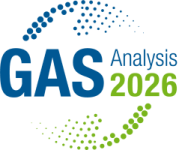Share your research findings with gas analysis experts from all over the world!
Call for abstracts now OPEN until Friday 20 June 2025!
GUIDELINES
- Check all boxes that apply and complete the required fields in ENGLISH ONLY
- Provide an abstract between 250 and 350 words (see also evaluation criteria below)
- Use one form per proposed lecture or poster presentation
- Ensure that you are available physically to present your lecture or poster in Paris, if approved
- Reply to authors will be done in August-September 2025. Final presentations are expected in December 2025.
- Accepted authors can publish a full article in "EDP Sciences" journal alongside the congress participation (to be confirmed).
EVALUATION CRITERIA
Abstracts are subject to approval by the Scientific Committee of GAS Analysis 2026. The Scientific Committee will use the following criteria for evaluating the abstracts:
- New developments and innovative approaches in gas analysis – Advances in measurement sciences, methodologies, and technologies.
- Technology driven – The abstract presents the research and development aspects that may include the possible applications of the results, but not promoting any commercial application
- Tackling relevant issues – The abstract presents results that are related to challenges the world is encountering today and in future
- Quality – The abstract is clear, consistent and well-written, avoids the use of jargon and reflects its given title. It must be accessible to the audience and effectively highlight the key message or contribution.
- Metrology community (optional) – To qualify for a lecture in the sessions “Advances in gas metrology”, the work to be presented should have been done by or in collaboration with the metrology community (e.g. national metrology institute [NMI], designated institute [DI])
THIS YEAR’S THEMES
The symposium will focus on the following topics with lecture sessions, short courses and a large exhibition including a scientific poster area:
- Accreditation and interlaboratory comparisons
- Analytical technology including sensing, modelling and data handling
- CO2 capture for usage or sequestration (CCUS)
- Atmospheric monitoring
- Diversification of the gas supply by (blending of) unconventional gases and hydrogen
- Emission and ambient air quality monitoring
- Gas analysis in medical, life sciences and health applications
- Hydrogen purity, production, transportation and storage
- Digital transformation in gas analysis
- Measurements in support of zero-carbon emissions
- Methane-rich gases (natural and renewable gases and liquefied gases)
- Metrology, standardisation and certification
- Purity analysis, gas mixing preparation and passivation
- Quality management of industrial processes and products
- Regulation, codes and standards
- Sample conditioning, handling and sampling
- Trace contaminants

